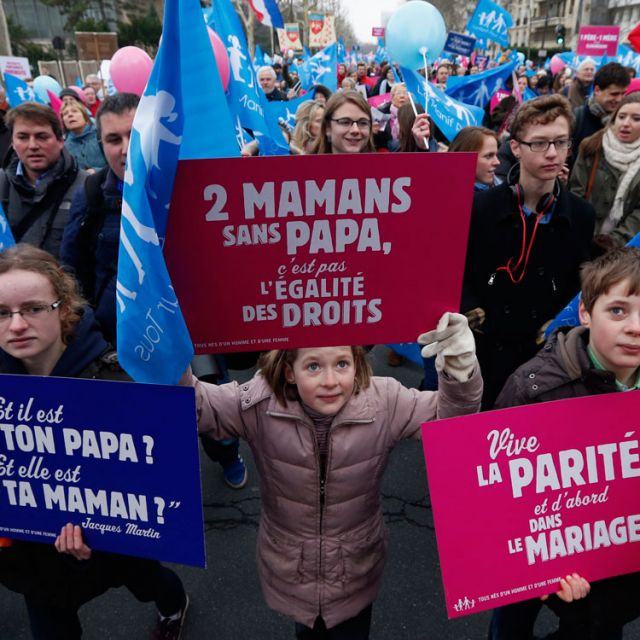“We’re facing questions about society — what the family is, what marriage is, and whether there’s a difference between men and women,” Msgr. Bernard Podvin, spokesman for the French bishops’ conference, told France’s Metro daily.
“I’m not one who says the street must decide, because this is always dangerous, and political responsibility rests with those elected. But the street is expressing a great frustration today — those holding political responsibility can’t expect to govern without listening to what it’s saying.”
The Jan. 13 demonstration was organized by a coalition of 30 family groups. Organizers said 800,000 people participated, although French police put the number at 340,000.
Podvin said the Catholic Church believed homosexuals “must be respected,” but was against the same-sex bill, which was introduced in November by the government of President Francois Hollande under the slogan, “Marriage for All.” In addition to legalizing same-sex marriage, it would allow adoption by same-sex couples.
“In our eyes, there’s nothing contradictory between fighting firmly against homophobia and saying no to a radical transformation of the family model,” Podvin said.
At the conclusion of the demonstration, protesters in Paris’ Champ de Mars called on Hollande to “hear and understand the people of France,” adding that the bill had “deeply divided” the population and provoked opposition “from right and left and the unaffiliated.” They said the legislation “means inscribing in our law a fundamental discrimination: between those who will be born from a father and mother, and those who will be legally ‘born’ from two fathers or two mothers.”
France’s Le Figaro daily said several Catholic bishops, including Cardinal Philippe Barbarin of Lyon, joined the rally privately with diocesan groups.
In a brief address to protesters in Place Denfert-Rochereau, the bishops’ conference president, Paris Cardinal Andre Vingt- Trois, praised protesters for the “quality of their message” and for taking part “peacefully, without aggression, distrust or personal hatred.”
“It must be understood that the defense of parentage, paternity and maternity over children isn’t an act of aggression against homosexuals, but a recognition that a child born from a man and woman has a right to be raised by a man and woman,” he said.
Supporters of the proposed legislation plan a rally in Paris Jan. 27, two days before debate is scheduled to begin in France’s National Assembly.
About 500 people, mostly French citizens, also gathered in front of the French Embassy in Rome Jan. 13 as a show of support for the Paris protesters. Organizers said they gave the embassy a letter addressed to the French president asking him to not promote the proposed laws. Similar protests were held by French citizens in London, Brussels, Madrid, Washington, D.C., Jerusalem, Moscow and Tokyo, organizers said.
Archbishop Vincenzo Paglia, president of the Pontifical Council for the Family, told Vatican Radio the Church supports cultural and social progress, but not “at the expense of nature.” He said he wondered why so many people were so committed to protecting the environment from manipulation, but “not very concerned about manipulation against the inner workings of anthropology.” Allowing same-sex couples to adopt “leads to the child becoming a kind of merchandise,” he said, adding that a child must be born and raised “the ordinary way, that is with a father and a mother.”
In England and Wales, more than a thousand Catholic priests signed an open letter warning British politicians that a bill to redefine marriage to include same-sex couples would erode religious liberty. The letter, published Jan. 12 in the London-based Daily Telegraph newspaper, urged lawmakers “not to be afraid to reject this legislation” when it arrives in the House of Commons later in the month.


